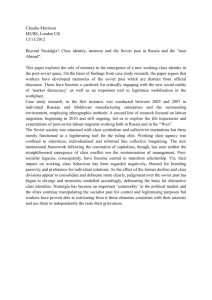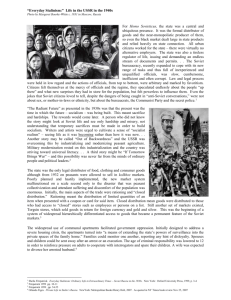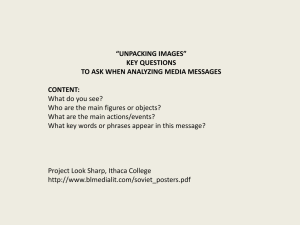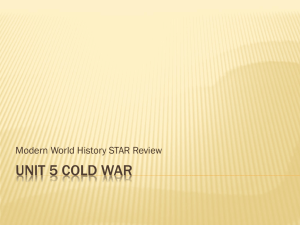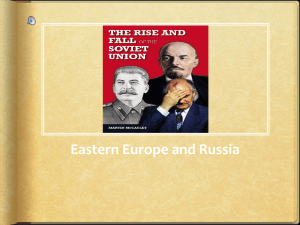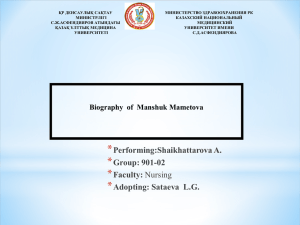Thesis Synopsis
advertisement
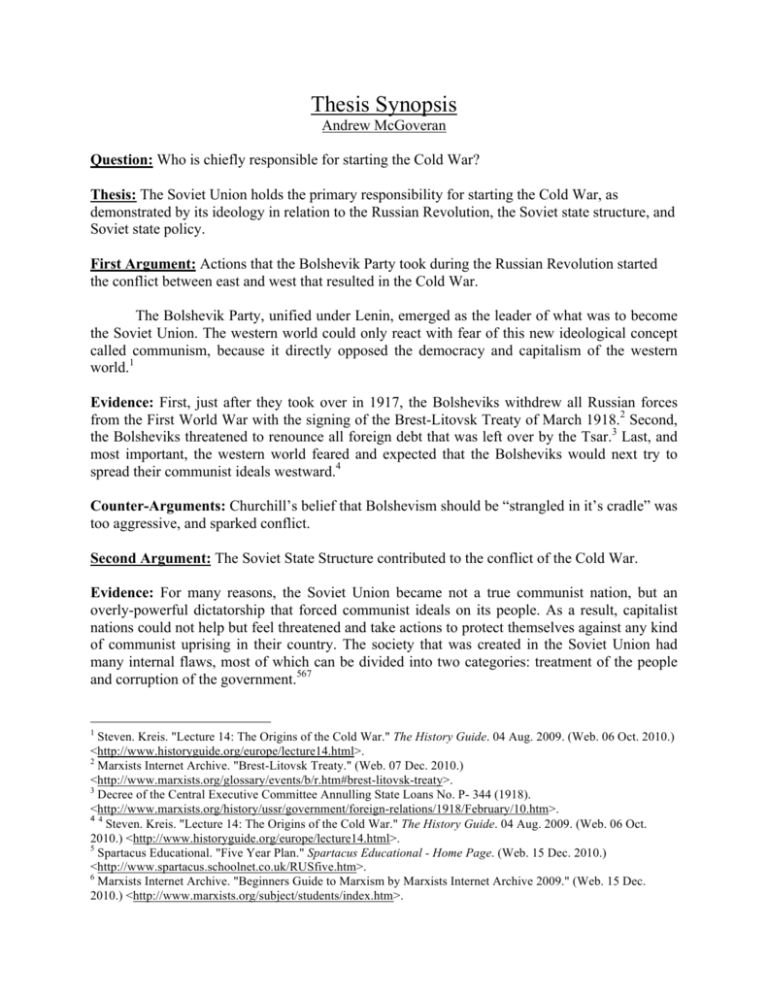
Thesis Synopsis Andrew McGoveran Question: Who is chiefly responsible for starting the Cold War? Thesis: The Soviet Union holds the primary responsibility for starting the Cold War, as demonstrated by its ideology in relation to the Russian Revolution, the Soviet state structure, and Soviet state policy. First Argument: Actions that the Bolshevik Party took during the Russian Revolution started the conflict between east and west that resulted in the Cold War. The Bolshevik Party, unified under Lenin, emerged as the leader of what was to become the Soviet Union. The western world could only react with fear of this new ideological concept called communism, because it directly opposed the democracy and capitalism of the western world.1 Evidence: First, just after they took over in 1917, the Bolsheviks withdrew all Russian forces from the First World War with the signing of the Brest-Litovsk Treaty of March 1918.2 Second, the Bolsheviks threatened to renounce all foreign debt that was left over by the Tsar.3 Last, and most important, the western world feared and expected that the Bolsheviks would next try to spread their communist ideals westward.4 Counter-Arguments: Churchill’s belief that Bolshevism should be “strangled in it’s cradle” was too aggressive, and sparked conflict. Second Argument: The Soviet State Structure contributed to the conflict of the Cold War. Evidence: For many reasons, the Soviet Union became not a true communist nation, but an overly-powerful dictatorship that forced communist ideals on its people. As a result, capitalist nations could not help but feel threatened and take actions to protect themselves against any kind of communist uprising in their country. The society that was created in the Soviet Union had many internal flaws, most of which can be divided into two categories: treatment of the people and corruption of the government.567 1 Steven. Kreis. "Lecture 14: The Origins of the Cold War." The History Guide. 04 Aug. 2009. (Web. 06 Oct. 2010.) <http://www.historyguide.org/europe/lecture14.html>. 2 Marxists Internet Archive. "Brest-Litovsk Treaty." (Web. 07 Dec. 2010.) <http://www.marxists.org/glossary/events/b/r.htm#brest-litovsk-treaty>. 3 Decree of the Central Executive Committee Annulling State Loans No. P- 344 (1918). <http://www.marxists.org/history/ussr/government/foreign-relations/1918/February/10.htm>. 4 4 Steven. Kreis. "Lecture 14: The Origins of the Cold War." The History Guide. 04 Aug. 2009. (Web. 06 Oct. 2010.) <http://www.historyguide.org/europe/lecture14.html>. 5 Spartacus Educational. "Five Year Plan." Spartacus Educational - Home Page. (Web. 15 Dec. 2010.) <http://www.spartacus.schoolnet.co.uk/RUSfive.htm>. 6 Marxists Internet Archive. "Beginners Guide to Marxism by Marxists Internet Archive 2009." (Web. 15 Dec. 2010.) <http://www.marxists.org/subject/students/index.htm>. Counter Arguments: The Soviet Union cannot be blamed merely for having a contrasting style of government. Third Argument: Soviet foreign policy contributed to the start of the Cold War. In the time during and after the Second World War, it became clear that peaceful relations between the United States and the Soviet Union were highly unlikely. The opposing ideologies that the two countries had set the stage for conflict, but there still had to be a trigger to make the tensions officially recognizable throughout the world. This trigger came in the form of Soviet Foreign Policy leading up to the Cold War. Evidence: After the war, Stalin demonstrated his expansionist policies by setting up satellite states across Eastern Europe. These satellite states were run by communist governments that were loyal and, in many ways subservient, to Moscow.8 These actions were perceived by the western world as signs of aggression as is exemplified by this excerpt from Winston Churchill’s famous Iron Curtain Speech, "From Stettin in the Baltic to Trieste in the Adriatic, an iron curtain has descended across the Continent."9 Counter Arguments: The United States decision to drop the bomb overrides all actions taken by the Soviet Union. Conclusion: While it is clear that both the Soviet Union and the United States took actions that contributed to the start of the Cold War, it is equally clear that the actions of the Soviet Union far outweigh those of the United States in the attribution of culpability. Due to its ideology in relation to the Russian Revolution, the Soviet state structure, and Soviet state policy, the Soviet Union holds primary responsibility for starting the Cold War. 7 Ibiblio. "Collectivization and Industrialization." Ibiblio - The Public's Library and Digital Archive. (Web. 11 Dec. 2010.) <http://www.ibiblio.org/expo/soviet.exhibit/collect.html>. 8 Loth, Wilfried. The Division of the World: 1941-1955.( London: Routledge, 1988. Print.) 9 History and Politics Out Loud "Winston Churchill and the Sinews of Peace Address." History and Politics Out Loud: a Searchable Archive of Politically Significant Audio Materials. (Web. 12 Dec. 2010.) <http://www.hpol.org/churchill/>.
